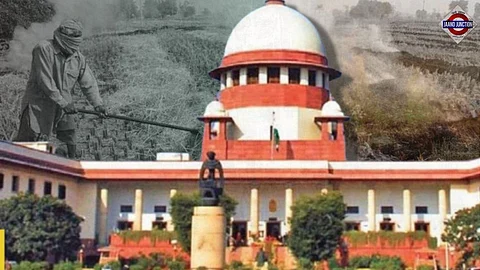

Air pollution in Delhi can't become a political battle, the Supreme Court said today, stressing that the choking air quality is responsible for the "murder of people's health". The court said the burning of crop residue in neighbouring states Punjab, Haryana, Uttar Pradesh and Rajasthan is a key factor behind the massive spike in Delhi's air pollution every winter. It asked the state governments to take steps to stop stubble burning. "We want it stopped. We don't know how you do it, it's your job. But it must be stopped. Something has to be done immediately," the court said.
The court did not spare Delhi government either. "Delhi government also must be responsible. There are many buses running that pollute and run at half capacity. You have to attend to the problem," it said.
The bench of Justice SK Kaul and Justice Sudhanshu Dhulia posted the matter for Friday. The court has asked Centre to hold a meeting with Uttar Pradesh, Rajasthan, Haryana, Punjab and Delhi governments on ways to stop stubble burning. It has also said it will look at vehicular emissions, another key contributor to Delhi's air pollution.
The court was hearing a case flagging the toxic air quality in the national capital, which has been in the 'severe' category over the past few days. According to the Central Pollution Control Board data, several areas in Delhi had an AQI of over 400 today, four times the satisfactory air quality level.
Appearing for the petitioner, Advocate Aparajita Singh said the farm fires in Punjab have not been checked. She said stubble burning is the top contributor to the slide in Delhi's air quality. "CAQM (Commission for Air Quality Management) and states are saying they are taking all steps to control air pollution. But stubble burning is still on," she said. The court said Delhi "cannot continue like this".
Senior Advocate Gopal Shankaranarayan, also appearing for petitioners, said this matter is being heard since 2017 and several orders have been passed.
The court also asked Punjab and Centre to look for an alternative crop to paddy. It flagged how paddy is also destroying the state's water table.
The annual spike in Delhi's air pollution levels and the role of stubble burning behind it has emerged as a politically charged issue over the past few years. The Aam Aadmi Party government in Delhi has earlier accused rivals' governments in Punjab and Haryana for not cracking down on the burning of crop residue.
The AAP finds itself in a tricky position now as it rules both Delhi and Punjab. It has claimed that stubble burning in Punjab has seen a big drop and shifted blame to BJP-ruled Haryana. Delhi Environment Minister Gopal Rai has said the BJP is scapegoating Punjab, while their governments have failed to ban diesel buses in Uttar Pradesh and Haryana.
The BJP has slammed the Arvind Kejriwal government, questioning the rationale behind announcing the odd-even scheme after Diwali and several other steps to check the air pollution in the capital. The effectiveness of the odd-even scheme was not backed by any research and it was being implemented as a "publicity stunt", Delhi BJP president Virendra Sachdeva has said.
The farmers have their reasons to burn the crop residue. They are pressed for time ahead of the winter sowing season and setting fire to the farms is the fastest and cheapest way to clear the field for the new crops. The alternative is to rope in labourers or machines to do to the job - both requiring considerable funds.
